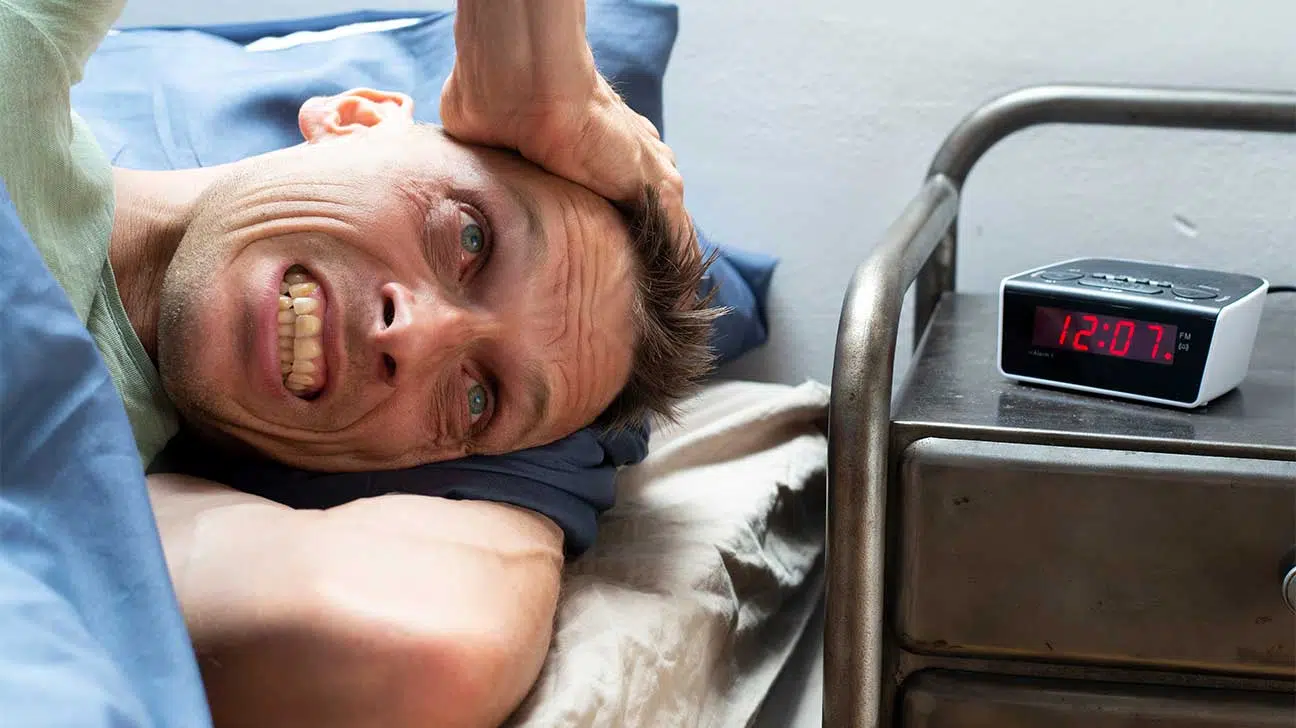How Meth Affects Sleep: Can You Sleep On Meth?
Methamphetamine is a stimulant drug that induces wakefulness, making it hard to sleep when high on the substance. With prolonged meth use comes poor sleep patterns, leading to negative effects on mental health.

Meths side effects can severely implicate someone’s mental health. Sleep deprivation is one of many health issues linked to meth addiction.
While it is possible to sleep on meth, typically, people who abuse this drug experience significant sleep disturbances.
Meth is an addictive and powerful substance that may keep someone up for days. Some go on binges, staying awake for days or weeks without sleeping or eating.
Even in small doses, meth can ruin sleep quality and create hyperactivity. Below we’ll explore how the use of methamphetamine can lead to sleep problems and other psychological issues.
How Meth Disrupts Sleep
The short-term effects of meth abuse supply people with bursts of energy, confidence, and wakefulness. It does this by injecting the brain with an overabundance of dopamine.
Meth also affects the brain by stopping the recycling of dopamine. The sensation of pleasurable feelings in the brain and the central nervous system can make someone continue to seek the drug.
Repeatedly snorting, injecting, or smoking crystal meth conditions the brain to only find pleasure from meth. Addiction and trouble sleeping are common side effects.
Increased Alertness
Meth makes someone hyper-alert to their surroundings and sensitive to light and other senses. Sleeping becomes very difficult with this heightened sensitivity.
It also creates increased focus on body movements, such as twitching and scratching. Some people high on meth will undertake cleaning projects lasting for hours.
Euphoria
One of the main reasons people ingest meth is because of the instant euphoria it delivers. It comes on as a rush of good feelings and confidence.
This rush is created by dopamine and serotonin filling the body. Some become addicted to this feeling and may continue to seek the drug, staying up for weeks on a “meth run.”
Restlessness
Meth acts as a boost of energy to the brain, stimulating a wide-awake state of mind. When someone continuously feels energetic, relaxing or sleeping is hard.
Mood swings are common with drug addiction, including meth use. Someone going back and forth between irritation then joyfulness can have disturbed sleep.
Hyperactivity
People on meth often display hyperactivity. They may repeat actions and phrases and sweat profusely.
They may go on long walks or pace back and forth. When there is a large supply of meth, they will not tire but continue feeling hyper, essentially nullifying the need to sleep.
Meth Withdrawal And Sleep Patterns
The short-term effects of meth hinder sleep and sleep patterns. However, even when meth use is stopped, withdrawal symptoms may cause further sleep issues.
A meth comedown usually involves a “crash.” During a crash, a person may go through several uncomfortable physical and mental symptoms that disturb quality rest.
Beginning Of Narcolepsy
Though meth is a Schedule II controlled substance, it can be prescribed for medicinal reasons, such as for the treatment of attention deficit hyperactivity disorder (ADHD) and narcolepsy.
Narcolepsy is a mental health disorder characterized by an inability to control sleep patterns. Someone with narcolepsy may randomly feel fatigued and fall asleep during the day.
But meth abuse can lead to the onset of narcolepsy because it disrupts regular sleeping schedules.
Poor Sleep Quality
After long meth binges, the body has to adjust to not having high dopamine levels.
As the body becomes accustomed to the lack of meth, a person may have trouble sleeping through drug cravings and other uncomfortable symptoms.
Less Sleep Time
Many find they cannot sleep during meth withdrawal. A meth comedown usually involves insomnia as the body still hasn’t found its sleep schedule yet.
Dangers Of Sleep Deprivation
Sleep is one of the most important functions the human body needs. When a person doesn’t get enough sleep, it can create many short-term and long-term problems.
Some of these are:
- psychosis
- heart attack
- increased blood pressure
- diabetes
- mood swings
- trouble concentrating
- aggravation
- depression
- anxiety
- quickened heart rate
Holistic Ways To Treat Meth-Induced Insomnia
Addiction treatment options are the best way to recover from the effects of meth and meth withdrawal. However, there are also holistic ways to treat insomnia from substance abuse.
Holistic approaches to treat insomnia from meth are:
- meditation, breathwork, reiki, or yoga
- long walks, running, jogging, or hiking
- eating a healthy diet and cutting down on caffeine
- avoiding taking other substances
- structuring a sleep schedule
Professional treatment, such as medical detox followed by therapy, may be needed if sleep troubles continue.
Meth Addiction Treatment In Massachusetts
Our rehab center in Massachusetts can help you or a loved one overcome drug addiction.
At Spring Hill Recovery Center, we have many treatment options, such as inpatient programs and outpatient services, to treat substance use disorders.
Reach out to one of our drug specialists today and learn more about our facility.
- My Health Alberta — Methamphetamine https://myhealth.alberta.ca/Health/Pages/conditions.aspx?hwid=uq2453
- National Institute On Drug Abuse — Methamphetamine DrugFacts https://nida.nih.gov/publications/drugfacts/methamphetamine
- National Library Of Medicine — The Relationship Between Sleep And Drug Use Characteristics In Participants With Cocaine Or Methamphetamine Use Disorders https://www.ncbi.nlm.nih.gov/pmc/articles/PMC4119803/


